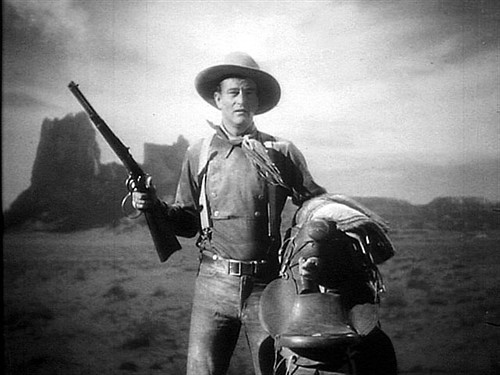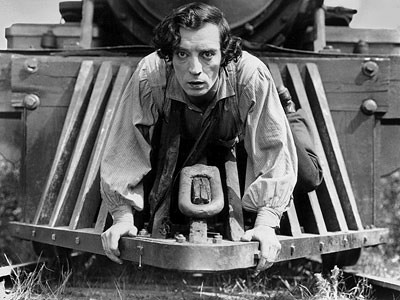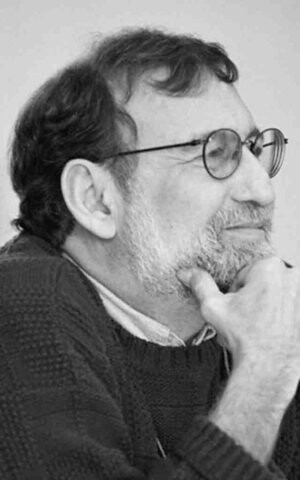Origins of Geekscape: Eulogizing a Personal Hero
From the spring of 1998 until my graduation in May of 2001, I took five courses under University of Pennsylvania professor John Katz. When I was told I couldn’t take any more classes towards my film minor, I sat in on two more. Looking back at your education, can you imagine a college professor you wanted to spend one semester with, let alone that many? I don’t have to imagine it. It’s the story of meeting one of my life’s heroes and the life that he gave to me ten years ago.
Penn didn’t have a film major back then and the film minor was very crowded and popular. Many of the film classes counted towards my Communications major from Annenberg and in the spring of my Freshman year I remember thinking that I would take the Intro to Film Studies class because I liked watching movies and that the class would probably be easy. And the class was easy, but not because the material was simple or came at a leisured pace. For the first time in my life, a professor made it easy to learn.
John Katz was a short, bearded and bespectacled man that always looked a bit crooked to me. His back looked crooked. His fingers looked crooked. His eyebrows looked crooked. He even sat crooked. I’d learn later that he was going through dialysis and battling kidney failure, which was responsible for his teaching from a chair during his first two classes with me. The only things that I remember didn’t seem bent about the guy on that first day was his smile and his voice. It turns out that this was all he needed to show me film’s transformative power. In history of film we started with the basics, from Eadweard Muybridge’s moving horses through Robert Flaherty and John Grierson going toe to two in documenting the early 20th century. The tragic stories of Flaherty’s subjects always hung with me, almost as large as the images himself. “Nanook of the North”‘s eskimo died when he hunted to far from his village after the making of the film. The Samoan boy who was tattooed in “Moana” moved to London and died a suicidal alcoholic. I even wondered about Muybridge’s horse and how it was still alive to us over a century later, running around a track in full health.
Thanks to John Katz, I discovered some of my favorite films of all time, including my untouchable favorite: Vittorio DiSica’s “The Bicycle Thieves”. My brother’s death was very much a daily struggle for me in those years and that movie and its backdrop in war torn Rome and a father’s search for stability resonated with me unlike any movie I’d ever seen. Jean Renoir’s “The Rules of the Game” showed me the best opening minutes in movie history. The simple storytelling of Jim Jarmusch’s “Stranger Than Paradise” put up against the insane ramblings of Godard’s “Week End”. I had no ideas movies could be like this. “Cleo from 5 to 7” is the movie I bring up in meetings the most. Why? I don’t know. Watch the movie. I shouldn’t even like it. But I love it (and it shows you the mid-90s fascination with pacing a movie in “real time” was not only old hat but had zero to do with story or character). “Stagecoach” introduced me to what it meant to be a real movie star and how to really shoot movie stars as I could see my love of Chow Yun Fat’s cool in “The Killer” reflected in Ford’s treatment of John Wayne. And the best stabbing scene in film history isn’t in “Psycho” but in Bertolucci’s “The Conformist”. My mind was a scrambled egg on high heat.

John Wayne’s intro in Stagecoach. This is the push in dolly shot I would ape years later to introduce George McClain in Gay by Dawn.
John Katz’s classroom was Geekscape before there was a Geekscape. John was funny. Damn funny. And he knew what he was talking about and rolled deep. Every summer he took a group of students to Cannes. Not going on one of these trips is one of the biggest regrets I have. In fact, the Kickboxer poster I have in my office which can be seen in the majority of Geekscape episodes came back from Cannes with my roommate Marc Brunswick on one of these trips. He was friendly with both Roger Ebert and Lloyd Kaufman. He was a programmer for the Philadelphia Film Festival. He had produced a movie and seen it released. When other teachers threatened to give me an incomplete, he pushed me to go home for two weeks and document my family’s mourning process. Upon seeing ten minutes of footage he told me he would program the film in the festival when it was completed. He understood when I told him that just shooting the movie was what I had needed to do for myself and I didn’t want to take it further. The hours of footage still sit in a box at my parent’s house, completely untouched. Shooting it allowed me to start compartmentalizing what had happened to us and try to process what I was going through. Without John’s urgings or his teachings, I wouldn’t have discovered this form of artistic therapy. I’d probably be pretty messed up right now.
Sadly, I am a bit messed up right now. This past Thanksgiving morning, I woke up early. There was snow on the ground in Seattle and I was still warm in bed. I could tell my wife was awake too because I could sense her gauging whether or not she wanted to leave the warm comfort of the bed to start dealing with family. It was a perfect time to spring a trap and introduce her to another film classic. We laid in bed and watched Buster Keaton’s “The General” on my lap top, delaying whatever the day would bring for a bit further. “The General” is a perfect film. And as much as you guys think I hate almost everything (a trait we always accused John of as students), it’s rare for me to call any movie perfect. But Clyde Bruckman and Buster Keaton’s movie is perfect. Shot in 1926, it has early Michael Bay-like destruction scenes (no ILM back then!), Jackie Chan level stunt work, a story that moves at a clip with some hilarious scenes and character, character, character. Watch the film. It’ll bend your mind, the level of things they are doing in 1926. The screen direction throughout the film is strict. The set pieces are all sharp. It’s a perfect film. And it took me back to sitting in that classroom watching it with John Katz in 1998. I twittered that I was thankful for all the films that inspire me.

Buster Keaton in The General
And then the next morning happened. Friday, I was sitting in SeaTac airport waiting for our flight when I received an e-mail from my friend Adam Wilkins, another one of John’s students who still kept in contact with John and his wife Joan. The subject line just read “Sad News” and like that phone ringing in my upstairs bedroom in June of 1996 the night my brother was killed I knew that the message on the other end was a terrible one. John Katz had passed away that morning.

John Katz (1938-2010)
I guess that facing an enormous personal vacuum upon saying goodbye is the price you must pay in knowing your heroes as real people. We all want to be a part of the things that inspire us. We want them to know what they mean to us even though words can’t express it. We want to live in those moments of inspiration long enough to reach (or even glimpse) equal heights of ability, knowledge or understanding. Maybe they will bring a permanence with them, a gold that always stays. You’ll be better for it and what you see in them you can possibly unlock inside yourself. Maybe it really does work. My DVD collection has a lot of John Katz in it. My film knowledge and conversations are all influenced by John Katz. What you all hear each week has a lot of Professor John Katz in it. The enthusiasm that people like William Bibbiani (a very John Katz like person in my life) and I share with you is all very John Katz. In this way, has a human hero I’ve known in my life continued to live on in what we do here? Have we found a way to keep a part of him with us? I have to think that the answer is yes. The proof is all around me. It is in everything that I do and create, as historically legitimate as Muybridge’s horse, still running around that track over a hundred years later, just as unconscious to the effects he will continue to have as the years go on.

John Katz was 72 and is survived by his wife Joan Saltzman, whose book Mr. Right and My Left Kidney chronicles their courtship and Joan’s donation of her kidney to John in 1999. It is available here at Amazon.com. I gave it to my step-mother as a Christmas gift when it was released and she tore through it in one night. It’s fantastically moving.
And here is the obituary from The Philadelphia Inquirer, revealing that ultimately, Canada IS responsible for Geekscape.
